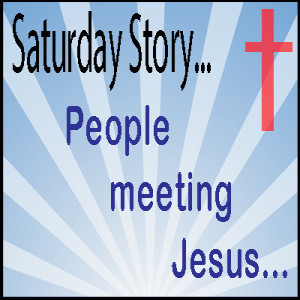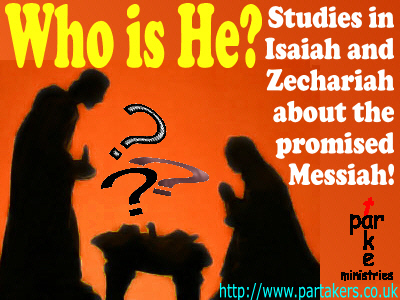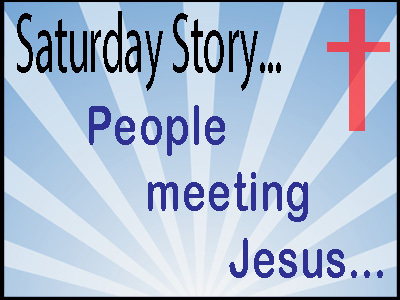
432.6K
Downloads
3364
Episodes
G’day and welcome to Partakers Christian Podcasts! Join us for uplifting Bible teaching, inspiring readings, heartfelt worship, powerful prayers, and fascinating church history. Whether you’re new to faith or growing deeper in your journey, we’re here to encourage and equip you. 🎧 Tune in, interact, and be inspired—wherever you are in the world.
G’day and welcome to Partakers Christian Podcasts! Join us for uplifting Bible teaching, inspiring readings, heartfelt worship, powerful prayers, and fascinating church history. Whether you’re new to faith or growing deeper in your journey, we’re here to encourage and equip you. 🎧 Tune in, interact, and be inspired—wherever you are in the world.
Episodes

2 days ago
Saturday Testimony - Life
2 days ago
2 days ago
Saturday Story
People meeting Jesus
The story of Life from the Faroe Islands...
Today we hear the story of a friend of mine. Her name is Life and she is from the Faroe Islands. Let's look together at how and why she started her Christian journey and the relevancy of Jesus Christ to her life! Come and listen to her story of faith...

2 days ago
Atonement 5 – Atonement is At-One-Ment
2 days ago
2 days ago
Atonement 5
Conclusion: Atonement is At-One-Ment?
Today we continue our series of 5 podcasts concerning that big Bible Word, Atonement. We seek to explore what conclusions we can make concerning Jesus Christian, Atonement and people today.
We will look at 6 blessings and consequences because of the atonement and our acceptance of it: Atonement sealing; Atonement peace; Atonement reconciliation; Atonement salvation; Atonement gathering and Atonement life to come.
Come and listen to find out more!
Right mouse click or tap here to download as a mp3 file

3 days ago
Atonement 4 – Atonement and Jesus Christ
3 days ago
3 days ago
Atonement 4
Atonement and Jesus Christ
Today we continue our series of 5 podcasts concerning that big Bible Word, Atonement, and continue to link to Jesus Christ.
As we sum up the atonement for sin because of Jesus, let’s look very briefly at just four words in our quest to explain and explore atonement. Remember, that the Church has been discussing this for the last 2000 years and will probably continue discussing it, trying to work it out until the Lord Jesus comes again.
We shall look at amazing expiation, satisfying propitiation, precious redemption and sufficient substitution. These 4 words can be summed up by the phrase Atonement love.
Atonement love is good news! When was the last time that you, as a Christian, told somebody else of this love
Right mouse click or tap here to download as a mp3 file

4 days ago
4 days ago
Atonement 3
Atonement Today (Romans 3:21-26; Hebrews 10:1-10)
Today we continue our series of 5 podcasts concerning that big Bible Word, Atonement.
21 But now apart from the law the righteousness of God has been made known, to which the Law and the Prophets testify. 22 This righteousness is given through faith in Jesus Christ to all who believe. There is no difference between Jew and Gentile, 23 for all have sinned and fall short of the glory of God, 24 and all are justified freely by his grace through the redemption that came by Christ Jesus. 25 God presented Christ as a sacrifice of atonement, through the shedding of his blood – to be received by faith. He did this to demonstrate his righteousness, because in his forbearance he had left the sins committed beforehand unpunished 26 – he did it to demonstrate his righteousness at the present time, so as to be just and the one who justifies those who have faith in Jesus. (Romans 3:21-26)
Here we see in Romans, that salvation is for all who believe, regardless of who they are and regardless of social status and stature. Salvation is through faith alone by grace alone to any person of any age or nation, who put their trust in God alone through Jesus Christ alone. Jesus Christ alone and through His atoning sacrifice on the cross. Declared righteous before God the Father, because of atonement through God the Son, Jesus Christ and Him alone.
In the podcast today we look at questions such as: what does Atonement mean for us today? What does Atonement have to do with salvation?
Right mouse click or tap here to download as a mp3 file to find out more.

5 days ago
5 days ago
Atonement 2
What was the Day of Atonement all about?
Today we continue our series of 5 podcasts concerning that big Bible Word, Atonement, seeking to answer the question ”What was the Day of Atonement all about?”.
Leviticus 16:1-10 starts by referring back to Leviticus 10, with the story of Abihu and Nadab, Aaron’s sons. Through their death, the Lord God states the fundamental principles for priests – only these priests could mediate for the nation before Him and they had to be spiritually and ceremonially clean, and as we have seen, do things obediently and properly. Worship of God was, and is, to be on God’s terms and His terms alone.
Could that describe our worship today – worship of God on His terms alone and not with our own self-defined terms and conditions, personally and corporately?
In this podcast we discover briefly together at the sacrificial offerings, why a sacrifice was necessary, the significance of blood, the role of Aaron and the work of the scapegoat.
Right mouse click or tap here to download as a mp3 file

6 days ago
6 days ago
Atonement 1
Introduction and Day of Atonement (Leviticus 16:1-10)
Today we start a series of 5 podcasts concerning that big Bible Word, Atonement. We shall endeavour to look together at what, why, how, when, who and so what of that word, atonement. Other religions, such as Islam, and the cults of Mormonism and Jehovah Witnesses, have their own understanding, so it is a word not just used by Christians.
Atonement is to clean, cleanse, cover over, make amends, pacify, satiate, satisfy, to substitute and to bring about reconcilement. Amazing Atonement. Atonement can also be pronounced as at-one-ment, because atonement brings together as one, and it is also the state of ‘being at one’.
In the podcast today we look at the question: "Why is there a need for atonement in relation to God and humanity?" We then go on to start to look at the Day of Atonement as described to us in Leviticus 16:1-10. Come and listen!
Right mouse click or tap here to download as a mp3 file

Monday Dec 29, 2025
Thought For The Day - Reading The Bible With Confidence
Monday Dec 29, 2025
Monday Dec 29, 2025
Reading The Bible With Confidence
Click or tap here to save/download this talk as a MP3 file
Aim: to discuss briefly the following things regarding the Bible.
1. What is the Bible?
- Bible can be used and abused
- Bible in history & society.
- Richard Dawkins & Dan Brown
- Other claims to be the Word of God - Koran, Book of Mormon
2. How did we get the Bible?
3. How did God give us the Bible?
- Revelation
- Inspiration
- Illumination
4. How to look up the Bible?
5. Why interact with the Bible?
- The Bible helps us know God more
6. How should we interact with the Bible? Keys to understanding the Bible ·
- Read it
- Inerrant
- No explicit contradictions
- Context matters
7. Some practical interactions with the Bible!
- Public & private reading.
- Memorizing
- Meditating or thinking about it
- Obeying it!
- Preaching & teaching.
Tap or click here to save/download this as a MP3 file

Sunday Dec 28, 2025
Bible Thought - Why I am a Christian
Sunday Dec 28, 2025
Sunday Dec 28, 2025
Why I am a Christian!
"We accept man's testimony, but God's testimony is greater because it is the testimony of God, which he has given about his Son. Anyone who believes in the Son of God has this testimony in his heart. Anyone who does not believe God has made him out to be a liar, because he has not believed the testimony God has given about his Son. And this is the testimony: God has given us eternal life, and this life is in his Son. He who has the Son has life; he who does not have the Son of God does not have life." 1 John 5:9-12
Today I share the reasons I am a Christian, a follower of Christ. Come and hear my story!
Right mouse click to save/download this testimony as a MP3 file

Saturday Dec 20, 2025
Christmas - Who is Jesus- 7. Messiah’s Leadership
Saturday Dec 20, 2025
Saturday Dec 20, 2025

Messiah's Leadership
10:1 Ask of Yahweh rain in the spring time, Yahweh who makes storm clouds, and he gives rain showers to everyone for the plants in the field. 10:2 For the teraphim have spoken vanity, and the diviners have seen a lie; and they have told false dreams. They comfort in vain. Therefore they go their way like sheep. They are oppressed, because there is no shepherd. 10:3 My anger is kindled against the shepherds, and I will punish the male goats; For Yahweh of Armies has visited his flock, the house of Judah, and will make them as his majestic horse in the battle. 10:4 From him will come forth the cornerstone, from him the nail, from him the battle bow, from him every ruler together. 10:5 They shall be as mighty men, treading down muddy streets in the battle; and they shall fight, because Yahweh is with them; and the riders on horses will be confounded. (Zechariah 10:1-5)
During the time of Zechariah, the Temple was being rebuilt. The Temple was central to Jewish worship. But who would help give advice and solve the multitude of problems they were facing? Who cared about them? Well, Zechariah speaks into their situation with wise words. He has already likened the nation of Israel as being like sheep, and that God is their shepherd (Zechariah 9:16) "Yahweh their God will save them in that day as the flock of his people; for they are like the jewels of a crown, lifted on high over his land. ". Throughout Chapter 10, it is repeated again and again, that God will care for and bless them. But in order to receive the blessing and care, the nation of Israelites must seek, turn and follow.
Seek God
If the people need advice and help in times of trouble and need, the first place they should look, is to the Lord their God. They must seek and ask of Him! (10:1)! God can provide all things! He can control the weather, but these people need to stop being so independent, self-sufficient and start to rely on God and His infinite wisdom and resources.
Turn to God
In 10:2, Zechariah reminds the people of Israel, that following idols and false gods is foolishness. These idols are self-seeking, liars and deceivers. Israel needed to turn back to the One True Almighty God! Instead of following the glory of the Almighty God, they were turning to idols for worship, advice and listening to superstitious nonsense. And of course idols and false gods are mute! They cannot speak or give advice because they are not Gods at all!! The sin of idolatry particularly broke the second commandment! The people were to turn away from false gods and return to worship the One True Almighty God. They were also to listen to the true prophets of God instead of the false prophets who deceived by speaking words they wanted to hear.
Follow Me
These sheep, the nation of Israel were to follow God. Instead of wandering around aimlessly, they were to follow and obey God Almighty. The Jewish leaders and teachers were supposed to be leading the nation in worship of Almighty God, but were not doing so. Hence God in 10:3 being enraged at those who were in positions of trust who were deceivers, liars and only looking out for their own interests. Ezekiel 34 expounds this out in much further detail!
So who were the people of Israel to follow? They were to follow the coming Messiah. Not only was the Messiah a King, Prophet Servant and Disciple but He would also be a Shepherd: the Good Shepherd! From the lowliest tribe of Judah, will come this Good Shepherd "But you, Bethlehem Ephrathah, being small among the clans of Judah, out of you one will come forth to me that is to be ruler in Israel; whose goings forth are from of old, from everlasting." (Micah 5:2)
Messiah Cares
This Good Shepherd will be utterly reliable, responsible, faithful and being the sure foundation that the people of Israel need, particularly in a time of crisis. In 10:4 God will send this Good Shepherd to also be a cornerstone, nail or tent peg, battle bow and a source of all ruling authority. Cornerstone: all ancient buildings needed a chief cornerstone to ensure a sure foundation so that the building could not fall down easily. It held two walls together. The imagery fits in well with the building of the Temple. If you want to continue worshipping God, then you must get the foundations right.
The chief cornerstone of the building holds the building together. Not only that, it gives the building shape, strength and all other stones are adjusted by it. Nail: Another translation is that of tent-peg. Just as the chief cornerstone holds the building together, so does a tent-peg ensure that the tent stays fastened down during storms! This Good Shepherd would ensure that everything is held together if they stick to Him. Battle-bow: Probably referring back to 9:13, Zechariah now likens this Shepherd Messiah to a battle-bow! This Good Shepherd will fight to keep the wolves from harming His sheep. He will battle for them. This Good Shepherd will be brave, courageous and strong as he leads his people to victory!
How is Jesus this Messiah?
Jesus said in Matthew 7:7-8 "Ask, and it will be given you. Seek, and you will find. Knock, and it will be opened for you. For everyone who asks receives. He who seeks finds. To him who knocks it will be opened." In other words, ask of God your heavenly Father and your needs will be supplied! That was how Jesus lived and obeyed, by being in constant communication with God the Father. That is how he could live a life of utter obedience to God, because He always asked, sought and knocked.
Jesus is the Good Shepherd, hence Him saying in John 10:11 "I am the good shepherd. The good shepherd lays down his life for the sheep." Again in John 10:14-17 "I am the good shepherd. I know my own, and I'm known by my own; even as the Father knows me, and I know the Father. I lay down my life for the sheep. I have other sheep, which are not of this fold. I must bring them also, and they will hear my voice. They will become one flock with one shepherd. Therefore the Father loves me, because I lay down my life, that I may take it again."
Jesus is the Good Shepherd only through the sacrifice he must make for His sheep. Here Jesus is looking ahead to the sacrifice He makes on the Cross. His love for all of humanity compels Him to make the ultimate sacrifice. Just as all shepherds will endanger themselves for the safety of their sheep, so too will Jesus endure the pain and suffering of the Cross, so that people can be led into safety of God's kingdom. It is in this role of the Good Shepherd, that Jesus exhibits true leadership, which is self-less and sacrificial. Ezekiel 34:11 tells of God searching out for his sheep among all nations, and this is fulfilled through Jesus.
Through His perfect, obedient and voluntary sacrifice on the Cross, not only will salvation be available to the Jews but also to those of other nations. And Jesus is willing to fight for His people! He gives spiritual armour for all those who follow Him to wear. Christians are in a spiritual battle reminds Paul in Ephesians 6, and as the Good Shepherd, Jesus will fight and battle for us through His indwelling Holy Spirit! For as the Bible says in 1 John 4:4 "You are of God, little children, and have overcome them; because greater is he who is in you than he who is in the world."
Jesus Christ is, as Peter reminds us in 1 Peter 2:8, the Cornerstone of faith - referring back to Isaiah 8:14. Jesus Christ is the dependable, sure foundation that all faith is to be ground upon. All Christians are living stones, but should be living on the dependability of Jesus Christ the chief cornerstone alone! It is only Him, who can give direction, assurance and be relied upon. It is Him that calls all people everywhere to seek for, turn to and follow obediently. Jesus Christ, Servant King, Servant Prophet, Servant Disciple, Servant Shepherd. Follow Him as the great leader He is and victory is assured! Whatever you are struggling with today, turn it over to God and ask for His help! He has promised to help! Remember that the battle belongs to the Lord! Amen! Just as Jesus said to Peter in John 21:19 "Follow Me!", so Jesus calls all those willing to follow Him, to follow Him for life. Follow and be led by Him and Him alone, regardless of what and where that might be.
Right mouse click or tap here to save/download this Podcast as a MP3 file

Thursday Nov 20, 2025
Thursday - Testimony - John
Thursday Nov 20, 2025
Thursday Nov 20, 2025

John's Story
"Feeling on the path to nowhere but there is a light at the end."
Today our testimony is from John... John is 32 years old, lives in the UK with his wife Nicole and has learning difficulties and epilepsy due to Tuberous Sclerosis...
Play or download the mp3 file to hear how John came into a dynamic relationship with God because of Jesus Christ. John - a 21st century Christian because of Jesus Christ, the Son of God. Why not make a comment below to encourage John?
Right mouse click to save/download this testimony as a MP3 file


